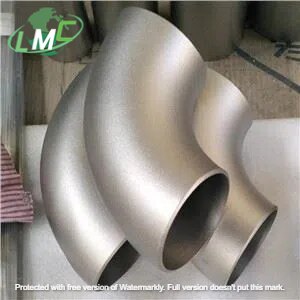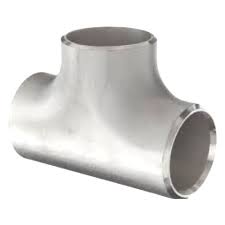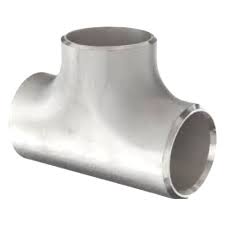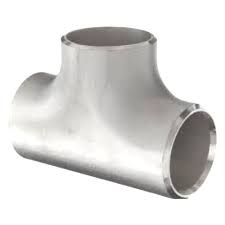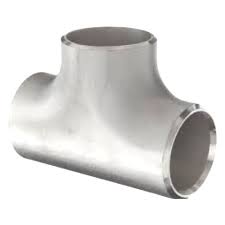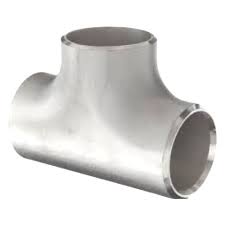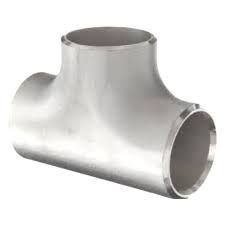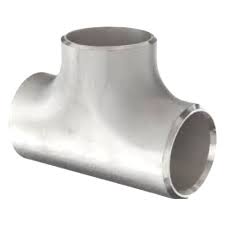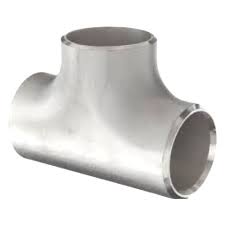Product Name: Titanium welded Elbows Standard: ASME B16.9 Material: Gr1, Gr2, Gr7, Gr12 Outer Diameter: 1/2"-48" Wall Thickness: Sch5s-Sch160s Technique: Seamless/Welded Titanium welded Elbows Titanium elbow is a pipe fitting used to change the direction of the pipeline, with 45 degrees, 90 degrees, 180 degrees, and other non-standard angle elbows according to engineering needs. Titanium elbows can be classified as welding elbows, stamping elbows, casting elbows, butt welding elbows, etc. Titanium welded elbow features: high temperature resistance, corrosion resistance, pressure resistance, light weight, non-magnetic, non-toxic, strong stability, long life Product: Titanium elbow Type: Long Pattern Short Pattern Material: Pure titanium or Titanium alloy Gr1, GR2, GR3, GR4, GR7, GR9, GR12 Specifications- Outer diameter: DN15-1200 NPS 1/2"-48" Wall thickness: 1-15MM Sch5s-Sch160 Standard: ASTM B363, ASME B16.9, ASME SB363, ANSI B16.9 Technique: Welded, Forged, Rolled, Seamless Surface finished: Sand blasting, Polishing, Pickling Quality control: 100% of the X-ray detection (RT) 100% of Surface penetrant inspection (PT) Application: Chemical, Petroleum, Machinery, Industry, etc. Other products Caps, flingers, socket welding fittings, valves available Technical requirement: 1. Since most pipe fittings are used for welding, in order to improve the welding quality, the ends are turned into grooves, with a certain angle and a certain edge. This requirement is also strict. There are regulations on the thickness of the edge, the angle and the deviation range. The surface quality and mechanical properties are basically the same as those of pipes. For the convenience of welding, the steel grade of pipe fittings and connected pipes is the same 2. Packaging requirements: for small pipe fittings, such as export, wooden boxes need to be made, about 1m3. It is stipulated that the number of elbows in such boxes cannot exceed one ton. The standard allows suits, that is, large sets and small sets, but the total weight generally cannot exceed 1 ton. For large pieces, a single package is required, such as 24 ″ Must be packaged individually. Another is the packaging mark, which should indicate the size, material, batch number, manufacturer's trademark, etc. LADHANI METAL CORPORATION, MUMBAI, INDIA Company Information Ladhani Metal Corporation. We are committed to integrate engineering steel resources in India and serve the global engineering steel market. Our company has more than 32 years of experience in steel researching, production, managing and sales. In the aspect of resources and information, we have established cooperative and stronger relationship with nearly hundred enterprises, either state-owned or private owned in India. What’s more, we have built long, deep and close business relationship with dozens of steel company, Sharing and holding equities with several steel enterprises. Because of the close cooperation with steel companies and our pioneering spirit, which can ensure us stay at the top competition, and ensure our customers get what they really want! FOR MORE DETAIL CONTACT US AT :- ladhanimetal@gmail.com ladhanimetals@gmail.com www.ladhanimetal.in www.ladhanimetal.com LADHANI METAL CORPORATION, MUMABAI, INDIA, AVAILABLE AT FOLLOWING LOCATION:- Adilabad, Agartala, Agra, Ahmedabad, Ahmednagar, Ajmer, Akola , Aligarh , Alipore , Allahabad , Alleppey , Almora , Alwar , Alwaye , Amalapuram , Amaravati , Ambala , Amreli , Amritsar , Anakapalle , Anand , Anantapur , Andhra Pradesh , Anna Road , Arakkonam , Arunachal Pradesh , Asansol , Aska , Assam , Aurangabad , Azamgarh , Bagalkot , Bahraich , Balaghat , Balangir , Balasore , Ballia , Banasanktha , Banda , Bangalore , Bankura , Barabanki , Barabazaar , Baramulla , Barasat , Bardoli , Bareilly , Barmer , Bastar , Basti , Beawar , Beed , Begusarai , Belgaum , Bellary , Berhampur , Bhadrak , Bhagalpur , Bharatpur , Bharuch , Bhatinda , Bhavnagar , Bhilwara , Bhimavaram , Bhiwani , Bhojpur , Bhopal , Bhubaneswar , Bhusaval , Bidar , Bihar , Bijapur , Bijnor , Bikaner , Bilaspur , Birbhum , Budaun , Bulandshahar , Buldana , Burdwan , Cachar , Calcutta , Calicut , Cannanore , Chamba , Chamoli , Chandigarh , Chandrapur , Changanacherry , Channapatna , Chattisgarh , Chengalpattu , Chennai , Chhatarpur , Chhindwara , Chikmagalur , Chikodi , Chitradurga , Chittoor , Chittorgarh , Churu , Coimbatore , Contai , Cooch Behar , Cuddalore , Cuddapah , Cuttack , Darbhanga , Darjeeling , Darrang , Dehra Gopipur , Dehradun , Delhi , Delhi , Deoria , Dhanbad , Dharamsala , Dharmanagar , Dharmapuri , Dharwad , Dhenkanal , Dholpur , Dhule , Dibrugarh , Dinajpur , Dindigul , divisionname , Dungarpur , Durg , Eluru , Ernakulam , Erode , Etah , Etawah , Faizabad , Faridabad , Faridkot , Fatehgarh , Fatehpur , Ferozpur , Gadag , Gandhinagar , Gaya , Ghaziabad , Ghazipur , Giridih , Goa , Goalpara , Gokak , Gonda , Gondal , Gorakhpur , Gudivada , Gudur , Gujarat , Gulbarga , Guna , Guntur , Gurdaspur , Gurgaon , Guwahati , Gwalior , Hamirpur , Hanamkonda , Hardoi , Haryana , Hassan , Haveri , Hazaribagh , Himachal Pradesh , Hindupur , Hissar , Hooghly , Hoshangabad , Hoshiarpur , Howrah , Hyderabad , Idukki , Indore , Irinjalakuda , Jabalpur , Jaipur , Jalandhar , Jalgaon , Jalpaiguri , Jammu , Jammu kashmir , Jamnagar , Jaunpur , Jhansi , Jharkhand , Jhunjhunu , Jodhpur , Junagadh , Kakinada , Kalahandi , Kanchipuram , Kanniyakumari , Kanpur , Kapurthala , Karaikudi , Karimnagar , Karnal , Karnataka , Karur , Karwar , Kasaragod , Keonjhar , Kerala , Khammam , Khandwa , Kheda , Kheri , Kodagu , Kolar , Kolhapur , Kolkata , Koraput , Kota , Kottayam , Kovilpatti , Krishnagiri , Kumbakonam , Kurnool , Kurukshetra , Kutch , Lakshadweep , Leh , Lucknow , Ludhiana , Machilipatnam , Madhubani , Madhya Pradesh , Madurai , Mahabubnagar , Maharashtra , Mahesana , Mainpuri , Malda , Malegaon , Mandi , Mandsaur , Mandya , Mangalore , Manipur , Manjeri , Mathura , Mavelikara , Mayiladuthurai , Mayurbhanj , Medak , Meerut , Meghalaya , Midnapore , Mirzapur , Mizoram , Monghyr , Moradabad , Morena , Mumbai , Murshidabad , Muzaffarnagar , Muzaffarpur , Mysore , Nadia , Nagaland , Nagaon , Nagapattinam , Nagaur , Nagpur , Nainital , Nalanda , Nalbari , Nalgonda , Namakkal , Nanded , Nandyal , Nanjangud , Narasaraopet , Nasik , Navsari , Nawadha , Nellore , New Delhi , New Mumbai , Nilgiris , Nizamabad , North Eastern , Odisha , Osmanabad , Ottapalam , Palamau , Palghat , Pali , Panchmahals , Pandharpur , Parvathipuram , Patan , Pathanamthitta , Patiala , Patna , Pattukottai , Pauri , Peddapalli , Pharbhani , Phulbani , Pithoragarh , Pollachi , Pondicherry , Porbandar , Prakasam , Pratapgarh , Proddatur , Pudukkottai , Pune , Punjab , Puri , Purnea , Purulia , Puttur , Quilon , Rae Bareilly , Raichur , Raigad , Raigarh , Raipur , Rajahmundry , Rajasthan , Rajkot , Rajouri , Ramanathapuram , Rampur Bushahr , Ranchi , Ratlam , Ratnagiri , Rewa , Rohtak , Rohtas , Sabarkantha , Sagar , Saharanpur , Saharsa , Salem , Samastipur , Sambalpur , Sangareddy , Sangli , Sangrur , Santhal Parganas , Saran , Satara , Sawaimadhopur , Secunderabad , Sehore , Shahdol , Shahjahanpur , Shimla , Shimoga , Shrirampur , Sibsagar , Sikar , Sikkim , Sindhudurg , Singhbhum , Sirohi , Sirsi , Sitamarhi , Sitapur , Sivaganga , Siwan , Solan , Solapur , Sonepat , Sriganganagar , Srikakulam , Srinagar , Srirangam , Sultanpur , Sundargarh , Surat , Surendranagar , Suryapet , Tadepalligudem , Tambaram , Tamilnadu , Tamluk , Tehri , Tenali , Thalassery , Thane , Thanjavur , Theni , Tinsukia , Tiruchirapalli , Tirunelveli , Tirupati , Tirupattur , Tirupur , Tirur , Tiruvalla , Tiruvannamalai , Tonk , Trichur , Trivandrum , Tumkur , Tuticorin , Udaipur , Udhampur , Udupi , Ujjain , Una , Uttar Pradesh , Uttarakhand , Vadakara , Vadodara , Vaishali , Valsad , Varanasi , Vellore , Vidisha , Vijayawada , Virudhunagar , Visakhapatnam , Vizianagaram , Vriddhachalam , Wanaparthy , Warangal , Wardha , West Bengal , Yeotmal , Bangalore , Hyderabad , Chennai , Kolkata , Jaipur , Indore , Thane , Pimpri-Chinchwad , Nashik , Kalyan-Dombivli , Vasai-Virar , Varanasi , Navi Mumbai , Hubli–Dharwad , Tiruchirappalli , Tiruppur , Salem , Mira-Bhayandar , Bhiwandi , Amravati , Noida , Jamshedpur , Bhilai , Cuttack , Firozabad , Kochi , Durgapur , Rourkela , Loni , Siliguri , Ulhasnagar , Sangli-Miraj & Kupwad , Ambattur , Thiruvananthapuram , Davanagere , Kozhikode , Maheshtala , Rajpur Sonarpur , Bokaro , South Dumdum , Gopalpur , Bhatpara , Panihati , Latur , Korba , Kollam , Avadi , Kadapa , Kamarhati , Rampur , Thrissur , Bardhaman , Kulti , Parbhani , Ozhukarai , Bihar Sharif , Panipat , Bally , Aizawl , Dewas , Ichalkaranji , Bathinda , Jalna , Kirari Suleman Nagar , Purnia , Satna , Mau , Sonipat , Farrukhabad , Imphal , Hapur , Arrah , Ambarnath , North Dumdum , New Delhi , Gandhidham , Baranagar , Tiruvottiyur , Thoothukudi , Ramagundam , Silchar , Haridwar , Vijayanagaram , Nagercoil , Sri Ganganagar , Karawal Nagar , Mango , Bulandshahr , Uluberia , Katni , Sambhal , Singrauli , Nadiad , Naihati , Yamunanagar , Bidhannagar , Pallavaram , Munger , Panchkula , Burhanpur , Raurkela Industrial Township , Kharagpur , Hospet , Nangloi Jat , Ongole , Deoghar , Chapra , Haldia , Amroha , Bhind , Bhalswa Jahangir Pur , Madhyamgram , Berhampore , Morbi , Raebareli , Khora, Ghaziabad , Bhusawal , Orai , Phusro , Mehsana , Raiganj , Sirsa , Danapur , Serampore , Sultan Pur Majra , Panvel , Shivpuri , Surendranagar Dudhrej , Unnao , Chinsurah , Alappuzha , Adoni , Katihar , Mahbubnagar , Jorhat , Sasaram , Hajipur , Bongaigaon , Dehri , Madanapalle , Bettiah , Ramgarh , Guntakal , Motihari , Dharmavaram , Medininagar , Phagwara , Hosur , Miryalaguda , Tadipatri , Kishanganj , Jamalpur , Kavali , Buxar , Tezpur , Jehanabad , Gangtok , Assam , Bihar , Chattisgarh , Delhi , Gujarat , Haryana , Himachal Pradesh , Jammu kashmir , Jharkhand , Karnataka , Kerala , Madhya Pradesh , Maharashtra , Odisha , Punjab , Rajasthan , Tamilnadu , Uttar Pradesh , Uttarakhand , west Bengal WE EXPORT TO FOLLOWING COUTRIES Switzerland , Afghanistan , Albania , Algeria , Angola , AntiguaandBarbuda , Argentina , Armenia , Aruba , Australia , Austria , Azerbaijan , Bahrain , Bangladesh , Barbados , Belarus , Belgium , Belize , Benin , Bhutan , Bolivia , BosniaandHerzegovina , Botswana , Brazil , Brunei , Bulgaria , BurkinaFaso , Burundi , CaboVerde , Cambodia , Cameroon , Canada , CentralAfricanRepublic , Chad , Chile , China , Colombia , Comoros , Congo , CostaRica , Côted'Ivoire , Croatia , Cyprus , CzechRepublic , Denmark , Djibouti , Dominica , DominicanRepublic , Ecuador , Egypt , ElSalvador , EquatorialGuinea , Eritrea , Eswatini , Ethiopia , Fiji , Finland , France , Gabon , Georgia , Germany , Ghana , Greece , Grenada , Guatemala , Guinea , Guinea-Bissau , Guyana , Haiti , Honduras , HongKong , Hungary , Iceland , Indonesia , Iran , Iraq , Ireland , Israel , Italy , Jamaica , Japan , Jordan , Kazakhstan , Kenya , Kiribati , Kosovo , Kuwait , Kyrgyzstan , Laos , Latvia , Lebanon , Lesotho , Liberia , Libya , Lithuania , Luxembourg , Macau , Madagascar , Malawi , Malaysia , Maldives , Mali , Malta , MarshallIslands , Mauritania , Mauritius , Mexico , Micronesia,FederatedStatesof , Moldova , Mongolia , Montenegro , Morocco , Mozambique , Myanmar , Namibia , Nauru , Netherlands , NewZealand , Nicaragua , Niger , Nigeria , NorthMacedonia , Norway , Oman , Palau , Panama , PapuaNewGuinea , Paraguay , Peru , Philippines , Poland , Portugal , PuertoRico , Qatar , Romania , Russia , Rwanda , SaintKittsandNevis , SaintLucia , SaintVincentandtheGrenadines , Samoa , SanMarino , SãoToméandPríncipe , SaudiArabia , Senegal , Serbia , Seychelles , SierraLeone , Singapore , Slovakia , Slovenia , SolomonIslands , SouthAfrica , SouthKorea , SouthSudan , Spain , SriLanka , Sudan , Suriname , Sweden , Taiwan , Tajikistan , Tanzania , Thailand , TheBahamas , TheGambia , Timor-Leste , Togo , Tonga , TrinidadandTobago , Tunisia , Turkey , Turkmenistan , Tuvalu , Uganda , Ukraine , UnitedArabEmirates , UnitedKingdom , UnitedStates , Uruguay , Uzbekistan , Vanuatu , Venezuela , Vietnam , Yemen , Zambia , Zimbabwe , Estonia , Nepal
Send Message
